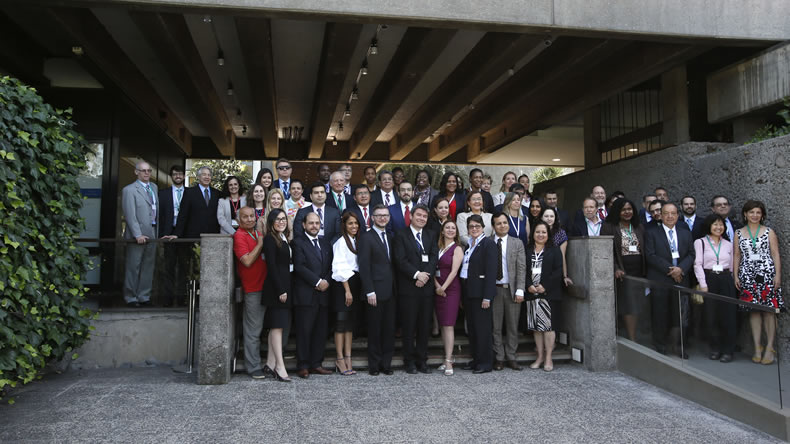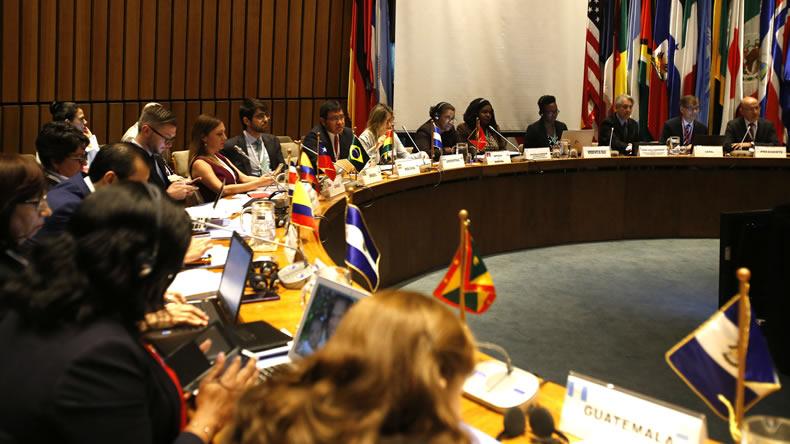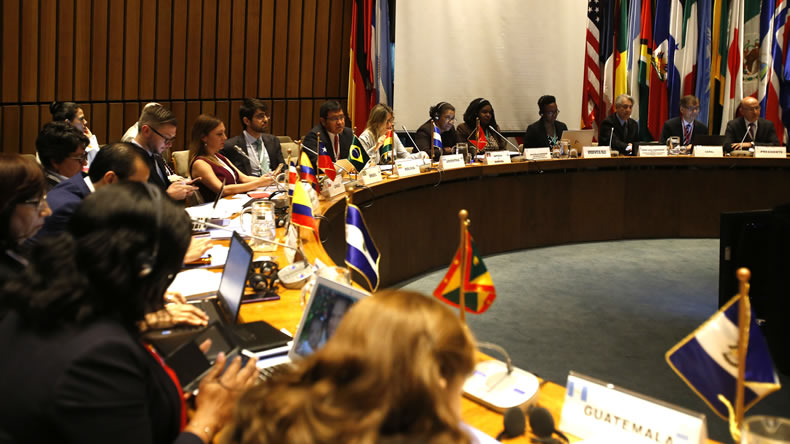In Chile, Countries Resume Negotiations on Regional Agreement that Enshrines Environmental Rights Promoted by the 2030 Agenda
Work area(s)
The Eighth Meeting of the Negotiating Committee of the Regional Agreement on Principle 10 will take place through December 1 at ECLAC’s headquarters.

Delegates from 24 governments in Latin America and the Caribbean, representatives of the public and experts from international bodies ushered in today the Eighth Meeting of the Negotiating Committee of the Regional Agreement on Access to Information, Participation and Justice in Environmental Matters (known as Principle 10 of the Rio Declaration on Environment and Development), at ECLAC’s headquarters in Santiago, Chile.
At the gathering, negotiations will continue to create an unprecedented legal instrument at a regional level that protects and regulates the rights of all persons regarding decisions affecting the environment.
The meeting was inaugurated this Monday, November 27 by the Co-chairs of the Negotiating Committee: Patricia Madrigal, Costa Rica’s Deputy Environment Minister, and Marcelo Mena, Chile’s Minister of the Environment; Danielle Andrade and Andrea Sanhueza, elected representatives of the public; and Joseluis Samaniego, Director of the Sustainable Development and Human Settlements Division of the Economic Commission for Latin America and the Caribbean (ECLAC), the organization holding the Technical Secretariat of this process.
During the opening session, special messages from Chilean President Michelle Bachelet and ECLAC’s Executive Secretary, Alicia Bárcena, were also transmitted via video.
In her message, the Chilean president indicated that Latin America and the Caribbean has the “unique opportunity to agree to the region’s first environmental treaty.” “The 24 delegations present at this meeting bear the responsibility of improving the well-being of 500 million people, and for that reason we must focus on what unites us: the urgent need to achieve sustainable development and environmental equity, deepening Principle 10 of the Rio Declaration,” the head of state said.
“We cannot compromise. This negotiation process will only be successful if we agree to an instrument that doesn’t replicate the shared minimum standards that we already have today. Reality demands that we go beyond this and make profound changes to the way we relate to our citizenry,” Bachelet added.
Meanwhile, ECLAC’s Executive Secretary recalled that “the rights of access enshrined in this Principle 10 are at the heart of the 2030 Agenda and are manifested in all the Sustainable Development Goals. This negotiation reflects our region’s commitment to the targets and goals established in that Agenda,” Bárcena stated.
“Guaranteeing all people, in conditions of equality and without discrimination, the rights of timely and effective access to environmental information, to participation in decision-making that affects the environment and to justice to ensure compliance with the laws, is a central element for fighting inequality and moving toward the sustainability of development,” the senior United Nations official emphasized. “These rights guarantee that the needs of the most vulnerable groups be taken into account and that no one be left behind. They are also closely related to human rights.”
Upon initiating this new round of negotiations, Joseluis Samaniego highlighted the important participation of the public in the process, as well as the efforts of Caribbean countries to be at the negotiating table despite the difficulties that they have had to face in recent months due to natural disasters. “This process shows the relevance of multilateralism and regional integration to making progress on the environmental sustainability of development. Having a harmonized instrument will allow us to build better-quality environmental policies,” he stressed.
Deputy Minister Patricia Madrigal recalled that five years ago, ten countries in Latin America and the Caribbean had signed the Declaration on the Application of Principle 10 in the region. “Now there are 24 nations that have expressed their will to participate in a process of construction regarding what it means to apply, develop, protect, safeguard and guarantee the right of access to information, to participation and to environmental justice, and more countries continue to join,” she said.
“The aspiration to achieve a Regional Agreement has allowed us to promote synergies, has put this issue on the political agenda and established a dialogue with civil society,” Madrigal explained. “This regional agreement prevents socio-environmental conflicts, strengthens the rule of law and reestablishes equilibrium among different social and institutional actors.”
Minister Marcelo Mena indicated that, in the final stretch of the negotiations, “as long as we remain ambitious, democracy and environmental equity will be strengthened in each of our nations, to protect the environment and contribute to the respect of all citizens’ human rights.”
“Chile supports a binding agreement. A treaty is the path that will allow us to protect the environment and the rights of the citizenry, guaranteeing not only high standards but also robust institutional frameworks,” the Chilean authority stated.
The elected representatives of the public, Andrea Sanhueza and Danielle Andrade, insisted on the need for the negotiations to enable reaching a substantive, genuine and realistic agreement that can be made effective and thereby produce a positive impact in people’s lives.
At the same time, they expressed their concern about how the talks have evolved. “We have reached a defining moment. This is the last opportunity to correct the direction we’re heading and take the original spirit of the process back up. We cannot allow for environmental and social rights to continue to be the ‘poor relatives’ of sustainable development. For that reason, the agreement must also ensure protection of environmental defenders,” Sanhueza stated.
The eighth meeting of the Negotiating Committee of the Regional Agreement on Principle 10 will continue through the week with discussion of the substantive aspects of the agreement, based on the seventh version of the text compiled by the Presiding Officers of the process, which includes the language proposals made by countries at the previous meeting held in Buenos Aires, Argentina, last July and August.
Members of the media are invited to attend this gathering. Journalists must have their media credentials or identity documents with them to gain access.
The meeting is being transmitted live on the Internet at this link.
Related event

Ninth Meeting of the Negotiating Committee of the Regional Agreement on Access to Information, Public Participation and Access to Justice in Environmental Matters in Latin America and the Caribbean
The Ninth Meeting of the Negotiating Committee of the Regional Agreement on Access to Information, Public Participation and Access to Justice in Environmental Matters in Latin America and the…
Related content


Countries Agree On Protection of Defenders of Human Rights in Environmental Matters during Negotiation of Regional Treaty
The Eighth Meeting of the Negotiating Committee of the Regional Agreement on Principle 10 concluded today at ECLAC’s headquarters in Santiago, Chile.
Related link(s)
Country(ies)
- Latin America and the Caribbean
Contact
Public Information Unit
- prensa@cepal.org
- (56 2) 2210 2040